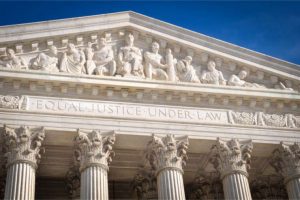The Carolina Journal—The U.S. Supreme Court has ruled, 8-1, that N.C. legislative leaders will be able to intervene in a federal lawsuit challenging that state’s voter ID law.
The decision reverses a ruling from the 4th U.S. Circuit Court of Appeals.
“[F]ederal courts should rarely question that a State’s interests will be practically impaired or impeded if its duly authorized representatives are excluded from participating in federal litigation challenging state law,” wrote Justice Neil Gorsuch for the majority. “To hold otherwise would not only evince disrespect for a State’s chosen means of diffusing its sovereign powers among various branches and officials. It would not only risk turning a deaf federal ear to voices the State has deemed crucial to understanding the full range of its interests. It would encourage plaintiffs to make strategic choices to control which state agents they will face across the aisle in federal court. It would tempt litigants to select as their defendants those individual officials they consider most sympathetic to their cause or most inclined to settle favorably and quickly. All of which would risk a hobbled litigation rather than a full and fair adversarial testing of the State’s interests and arguments.”
Lower federal courts had blocked state Senate leader Phil Berger, R-Rockingham, and House Speaker Tim Moore, R-Cleveland, from taking  part in the suit. The legislative leaders had argued that they had the right under state law to defend voter ID in court.
part in the suit. The legislative leaders had argued that they had the right under state law to defend voter ID in court.
“Nor are state interests the only interests at stake,” Gorsuch added in his majority opinion. “Respecting the States’ ‘plan[s] for the distribution of governmental powers’ also serves important national interests. It better enables the States to serve as a ‘balance’ to federal authority. It permits States to accommodate government to local conditions and circumstances. … And it allows States to serve as laboratories of ‘innovation and experimentation’ from which the federal government itself may learn and from which a ‘mobile citizenry’ benefits.”
“Finally, a federal court tasked with testing the constitutionality of state law wields weighty ‘authority over a State’s most fundamental political processes,” Gorsuch wrote. “Permitting the participation of lawfully authorized state agents promotes informed federal-court decisionmaking and avoids the risk of setting aside duly enacted state law based on an incomplete understanding of relevant state interests.”
Gorsuch rejected NAACP plaintiffs’ arguments against allowing Moore and Berger to participate in the case. Neither legislative leader had been named in the original suit.
“[A] plaintiff who chooses to name this or that official defendant does not necessarily and always capture all relevant state interests,” he wrote. “Instead and as we have seen, where a State chooses to divide its sovereign authority among different officials and authorize their participation in a suit challenging state law, a full consideration of the State’s practical interests may require the involvement of different voices with different perspectives. To hold otherwise would risk allowing a private plaintiff to pick its preferred defendants and potentially silence those whom the State deems essential to a fair understanding of its interests.”
“Through the General Assembly, the people of North Carolina have authorized the leaders of their legislature to defend duly enacted state statutes against constitutionalchallenge,” Gorsuch concluded. “Ordinarily, a federal court must respect that kind of sovereign choice, not assemble presumptions against it.”
Only Justice Sonia Sotomayor dissented from the majority decision, which she labeled “wrong for two reasons.”
“First, the Court goes astray by creating a presumption that a State is… read full article here




You must be logged in to post a comment.